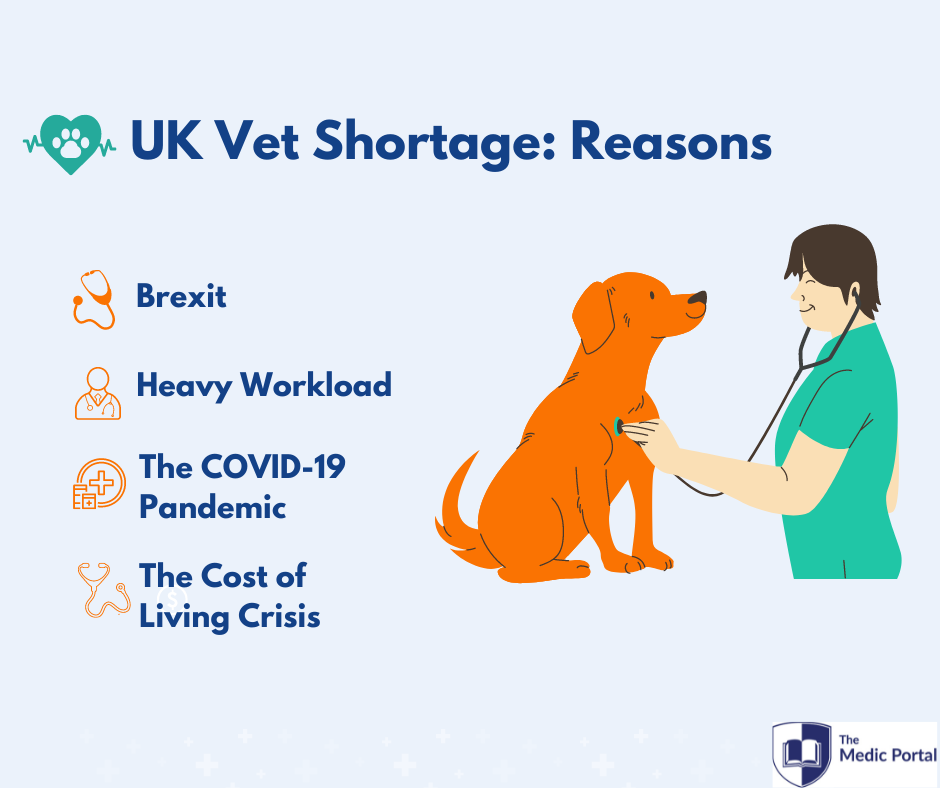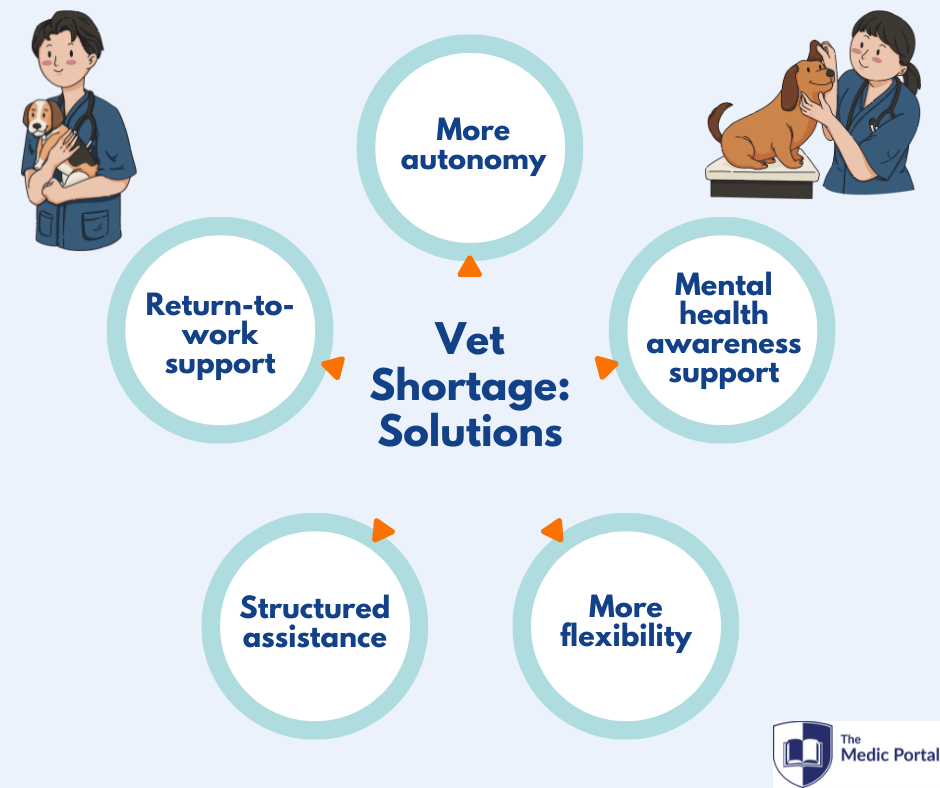Is There a Shortage of Vets in the UK?
Healthcare providers in the UK, including the NHS, are struggling with staff shortages. The EFRA committee has warned that domestic vet shortage has worsened since the estimate of 11.5 per cent made in 2018. This is a growing issue in the UK veterinary sector, which relies heavily on bringing qualified vets from overseas in order to improve its pool of available professionals.
The number of professionals coming to work in the UK has been steadily declining – especially post-Brexit. Data from the Royal College of Veterinary Surgeons (RCVS) shows that annually, the number of qualified vets moving to work in the UK dropped by 68% between 2019 and 2021.
However, a recent 2024 study commissioned by the Royal College of Veterinary Surgeons has found that the shortage is expected to ease slowly in the next decade, with the number of veterinarians expected to jump 52% by 2035.
Why Is There a Shortage of Vets in the UK?

There are numerous reasons for the shortage of vets in the UK, the most important of which are summarised below:
Brexit
The principal reason why there was such a large drop in the number of vets coming from overseas to work in the UK can be attributed to Brexit.
As a result of Brexit, the process for applying to work in the UK has become much more complicated, preventing many European candidates from easily migrating. This has contributed to the huge fall of 68% in qualified EU-based vets moving to the UK between the years 2019-2021.
According to Charles Hartwell, CEO of a provider of public health veterinary services Eville & Jones, prior to Brexit, there was a need for approximately 2,000 vets each year – with 1,000 produced by the UK vet school system. This created a gap of about 1,000 professionals filled by vets from the EU, which finished abruptly with Brexit.
This has been further impacted by changes to the salary threshold for a skilled worker visa, which now stands at £48,100 for veterinarians. This makes it even harder to access the pool of resources from overseas.
If you are looking to study Veterinary Medicine, the veterinary sector in the UK provides an excellent opportunity to study abroad before moving back to work in the UK, as almost 50% of new registrants in 2019 had graduated from universities outside of the UK.
The University of Nicosia School of Veterinary Medicine in Cyprus, for example, offers excellent veterinary courses for those who want to study outside the UK before bringing their expertise back.
Heavy Workload
Although very rewarding, the veterinary profession brings a big workload with it. Constant demands and lack of flexible working hours, particularly due to staffing shortages, have led to many vets changing jobs in search of a less demanding occupation with better working hours.
The COVID-19 Pandemic
The pressures of global lockdowns only added to the already high demand for vets, as practices had to follow strict health guidelines, meaning that staff members were often required to work overtime in order to make up for staffing shortages due to isolation rules.
Additionally, the surge in pet ownership during the pandemic (as people sought to find companionship during tough times of isolation) put additional pressure on vets, adding to already heavy workloads and reducing their flexibility.
The Cost of Living Crisis
Finally, living prices have skyrocketed nationwide while salaries have not risen to match the increase, so many vets have chosen to change jobs in favour of other career paths.
What Is Being Done to Solve the Vet Shortage Issue in the UK?

There are three main initiatives that have been put into place to tackle the issue of vet shortages in the UK:
The Workforce Action Plan
The Workforce Action Plan, published by Royal College of Veterinary Surgeons, has set out seven ambitions to help with workforce shortages. Some of their key strategies include:
- Greater responsibility for veterinary nurses – giving them more autonomy and reducing such a heavy reliance on vets in order to carry out procedures and make decisions within the practice.
- Shape leaders at all levels – promoting inclusive everyday leadership to try and reduce the burden on practising vets at all levels.
- Welcoming a modern way of working – promoting return-to-work support for clinical and non-clinical veterinary roles.
The Mind Matters Initiative
This is an initiative that was launched in 2015 to support those working within the veterinary sector, ranging from students to veterinary surgeons and practice managers.
It offers support, resources and courses, as well as mental health awareness training to reduce the stigma surrounding mental health within the workplace.
Vet Graduate Development Programme
This programme was established to support newly qualified vets, providing them with a period of structured assistance as they transition from university to employment.
They provide VetGDP Advisers who work with veterinary graduates to help them feel more at ease in their new roles, help build confidence and reduce anxiety.
What Else Can Be Done to Support Veterinary Professionals?
There is potential for veterinary professionals to be supported at all stages. At the university level, students may be given a mentor so that when they graduate and start practising as a vet, they will have a support system already built in.
Employers may help to facilitate more flexible working hours or part-time roles for those who wish to make this transition. Finally, pet owners could be less demanding in their requests from vets, keeping in mind the pressures that are already put on the UK staff.
Interview Tips
It is essential that you can demonstrate a well-rounded knowledge of the main issues facing healthcare providers in the UK (or abroad if applying to a university in a different country) during your interview.
The shortage of vets is a veterinary medicine hot topic, and you will be expected to know a few reasons underlying the staff shortages as well as be able to explain strategies that have already been implemented in order to tackle this issue.
Here are a few tips to take into account when approaching this topic in the medical interview:
- Revise at least two reasons for shortages of vets in the UK
- Be prepared to answer questions on any of the initiatives listed that are aimed at tackling the shortage of vets in the UK
- Keep up-to-date with any new initiatives or data that has been released surrounding this topic
- Practice answering some common interview questions and try linking them back to your knowledge of relevant hot topics
